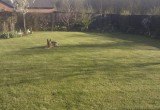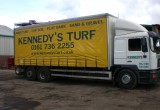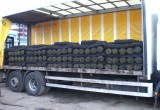How to Protect Your Garden from Kids and Dogs
Online, May 15, 2013 (Newswire.com) - A study has revealed that today's children play outdoors half as much as their parents did when they were there age. Researchers claim that youngsters are more likely to stay indoors and watch television or play computer games.
The study of 2,000 Mums and Dads revealed the average parent spent ten hours and 26 minutes playing outside during the working week when they were children - double the five hours and 32 minutes children head outdoors today.
Many parents claim they are frightened to allow their children out of sight, preferring to keep them safe in the garden.It is this fear of "stranger danger" which has seen a big increase in sales of play equipment such as trampolines.
However, many parents who are keen gardeners worry about any long term damage to their turf. They have worked hard to maintain general lawn maintenance and don't want their work undone.
Kennedy's Turf, based in Salford, advise placing all children's play equipment on a BS1177 grade material for fall protection.
A suitable product would be play bark. The bark is produced from mixed conifer bark and provides a clean play surface all year round.
Company spokeswoman Emma Scott said: "It is durable and long lasting and easy to use and maintain. It is also free from pests, weeds, pathogens and has not been treated with methyl bromide".
She added: "It should be noted that in order to give protection to the above BS standard the equipment and the fall protection material must be installed in accordance with BS1177."
A number of families erect equipment such as slides and swings in their garden but children dragging their feet as they prepare to stop can have a damaging effect.
Patches of dead grass soon appear but Kennedy's Turf argue it can be seeded up no problem.
Perhaps a more worrying problem is the damage the family dog can do to the garden.
"Dogs are indeed a problem, both from damage in general - dogs running on grass can damage it, behavioural issues such as digging and the like and of course burning from urine," said Mrs Scott.
She added: "If the grass is really dry, dogs running on it can pull it up and then it dies."
Female dogs are more of a problem than males because they usually squat and empty their bladders in one spot. The concentrated blast of urine acts as a massive dose of fertilizer in a single area, which causes the dead grass.
The most effective way to counteract the burn is to water the turf as soon as the dog urinates. It is also important to ensure that your pet has enough water in his diet. The more a dog drinks the more diluted his urine will be.
If your pet is digging up your lawn it is normally a behavioural issue. It could be down to boredom, playing or a release of energy. To try and counteract the problem and stop damage to your lawn you need to address the problems.
• Is your dog getting enough exercise?
• Is it having interaction with people?
• Are its chewing needs being met?
It would be ideal to have an area of your garden which the dog is able to dig in but this isn't always an option. Likewise, to prevent spots from urine burns a concrete yard would be advisable.
If the behaviour continues you could seek help from your local veterinary specialist and in the meantime keep re-seeding the offending areas of turf.


